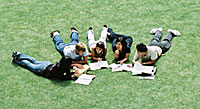|
||||||||||||||||||||||||||||||||||||||
| GPS Receivers and how they work - GMAT9201 | ||||||||||||||||||||||||||||||||||||||

Description This course will introduce the electronic and signal processing aspects of L1 Global Positioning System (GPS) receivers. The following topics will be dealt with: signal specifications, introduction to CDMA, calculating a position, problems receiver designers must overcome (multipath etc.), front end RF design, correlator principles and approaches, signal acquisition/reacquisition and tracking, how measurements are made, receiver interfaces, augmentation systems (e.g. EGNOS, WAAS) and a discussion of off-the-shelf solutions such as boardsets and chipsets. These principles will be illustrated using Matlab, allowing students to develop algorithm components of receivers.
|
||||||||||||||||||||||||||||||||||||||


